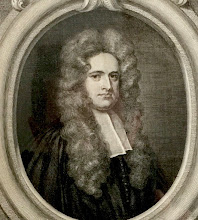Thursday, April 30, 2015
Physics, Economics, and Politics
The psychologist Carl Jung often considered basic laws of physics to understand and explain the principles at work in the human psyche. I think this concept can be equally applied to collective constructs like the state and economic systems.
As one extreme example, I'd suggest that North Korea, a totalitarian state with a notable lack of flexibility, spontaneity, or change, exemplifies a concept where a huge amount of "energy" is used to reduce entropy (in an attempt to literally stop it). Energy is used by the North Korean state to primarily direct centripetal forces toward the maintenance of the state and it's rigid economic system. In following this course, the state and its economic vitality are relatively static -- again, only after having expended great amounts of energy in achieving this objective.
As an opposite example, I'd suggest that the United States (up until recently) has utilized relatively little centrally directed energy to the purpose of reducing entropy. Therefore, entropy has occurred at a relatively high rate, resulting in a dynamic release of energy in a very spontaneous way. Individual players applying individual initiative have expressed a general centrifugal force away from the static maintenance of central authority.
So it is that America has always been changing and manifesting incredibly diverse expression that spills energy out symbolically as wealth creation and general creative impulse. The North Korean example (really, any authoritarian institution) uses the energy it has to the end of merely keeping things the same -- attempting to stop any natural impulse toward entropy. The statist ideal must use considerable amounts of the energy available to it to merely hold back the natural tendency toward energy release -- entropy. In so doing, it locks up the potential release of energy that manifests in a dynamic creative economy. The free ideal allows for the natural physical tendency toward entropy and thus does not squander energy or resources to the futile and unproductive goal of merely freezing a status quo. In fact, by allowing the the natural course of events to play out (entropy), vast amounts of energy are released in a sort of spontaneous chain reaction which shows up as incredible diversity and creativity. Of course, the ideal path the United States has been fortunate to have taken is now coming to a close and we can see that, as the state is invested with greater power, enormous resources (energy) are being directed to the mere maintenance of the state and obedience to it. As can be expected in this environment, the attributes of dynamism are slowed and creativity and wealth are stifled.
Statism/socialism is a whining obsessive directing its demand that all things remain static and lifeless. Free society allows for the spontaneous impulse in nature that produces diversity and positive evolution.
Thursday, April 23, 2015
Term Limits
The issue of term limits leaves any liberty-loving individual in a bit of a quandary. I used to be one who would say, as a matter of fact, that term limits already exist because the voter can limit a politician's term. Why should their free choice be limited? My view has completely changed as I now see that, if one's ultimate goal is to maximize personal freedom, one must rein in the inevitable results that a permanent political class brings to governing when the voting public permits such a political class to form -- and it usually does.
In a sense, the decisions of the voting population require checks and balances as much as any other branch of government.
Just as we can't allow "Majority rule" to trample on the rights of minorities or individuals, there must be some check on the careless errors that can occur in the election process when whim and the fashions of a time can leave future generations enslaved. We justly wouldn't wish to honor the free choice of putting a Hitler into power. Maintaining a free society requires distrust of anyone consolidating power, even it they've gained such power through the election process.
Sunday, April 05, 2015
Declarations of Independence
In expressing one's political alignment it's become common among many to say they are "independent." Of course, generically, it can be stated that one is simply not a follower of a specific political party, but more often than not it is used by many to convey their desire to be seen as "open-minded" (who doesn't want to be that?).
In the end, almost everyone independently arrives at their independent viewpoint, no matter where it is on the spectrum. True, some are more adaptable than others and some more open to accepting that others may differ in their views, but there is nothing wrong with having a general tendency in one's beliefs toward conservatism or liberalism. To state that one is independent is often a mere attempt to pretend that one is somehow outside and above of the argument. Everyone is in "the argument" no matter how objective they wish to see themselves.
I'm struck by how many times a person has noted their credentials as bonafide "independents" and then rambled a cookie-cutter critique of a situation that fit quite neatly into a clear position on the political spectrum.
One can be independent of surrounding pressure groups or collective norms of a time and place, but that in itself doesn't make them any more objective or insightful than anyone else who merely holds a belief on a given circumstance.
If there is any distinction with value to be made between styles of political appraisal, it is that of those who merely hold beliefs, and those who wish to impose them forcefully upon others. At various times throughout history, both Fascists and communists could have stated the "independence" of their position, but that hardly distinguished them as anything beyond garden variety dogmatists...and what's so "independent" about that?
